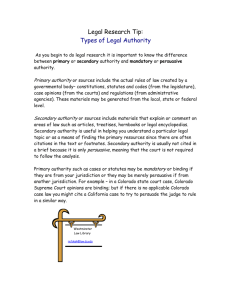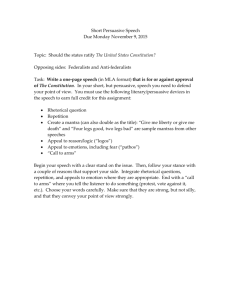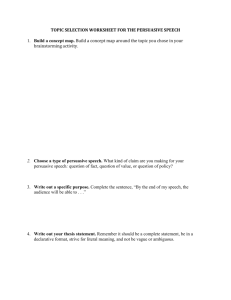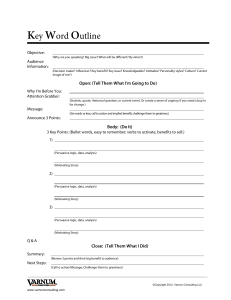Wrtg 1150: First Year Writing and Rhetoric
advertisement
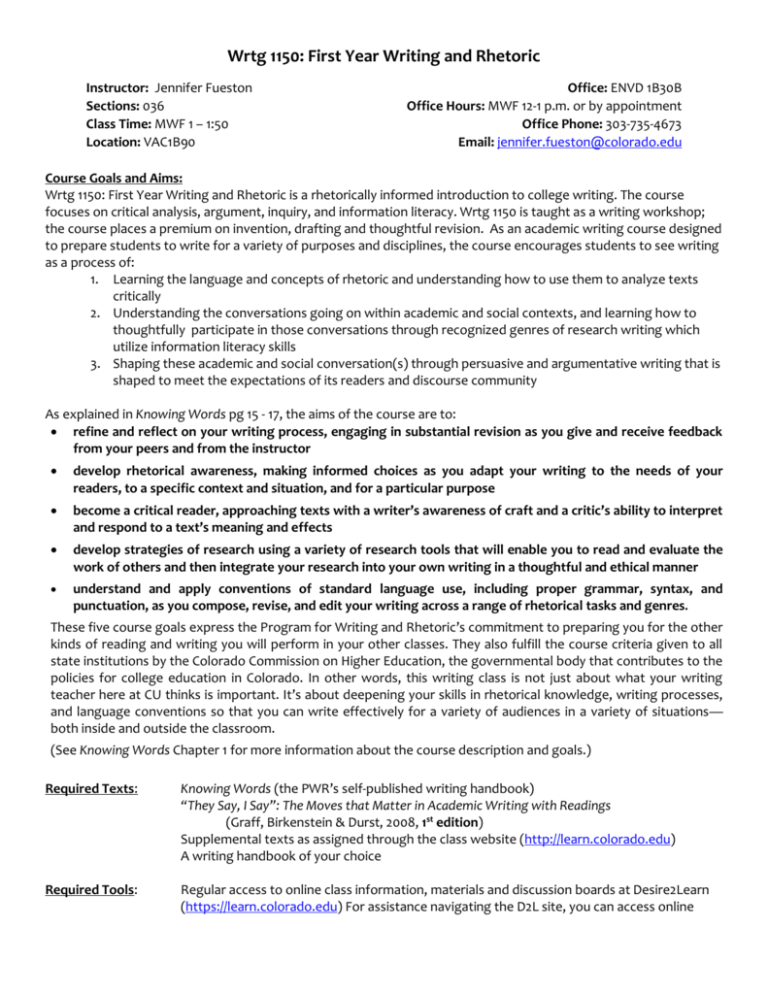
Wrtg 1150: First Year Writing and Rhetoric Instructor: Jennifer Fueston Sections: 036 Class Time: MWF 1 – 1:50 Location: VAC1B90 Office: ENVD 1B30B Office Hours: MWF 12-1 p.m. or by appointment Office Phone: 303-735-4673 Email: jennifer.fueston@colorado.edu Course Goals and Aims: Wrtg 1150: First Year Writing and Rhetoric is a rhetorically informed introduction to college writing. The course focuses on critical analysis, argument, inquiry, and information literacy. Wrtg 1150 is taught as a writing workshop; the course places a premium on invention, drafting and thoughtful revision. As an academic writing course designed to prepare students to write for a variety of purposes and disciplines, the course encourages students to see writing as a process of: 1. Learning the language and concepts of rhetoric and understanding how to use them to analyze texts critically 2. Understanding the conversations going on within academic and social contexts, and learning how to thoughtfully participate in those conversations through recognized genres of research writing which utilize information literacy skills 3. Shaping these academic and social conversation(s) through persuasive and argumentative writing that is shaped to meet the expectations of its readers and discourse community As explained in Knowing Words pg 15 - 17, the aims of the course are to: refine and reflect on your writing process, engaging in substantial revision as you give and receive feedback from your peers and from the instructor develop rhetorical awareness, making informed choices as you adapt your writing to the needs of your readers, to a specific context and situation, and for a particular purpose become a critical reader, approaching texts with a writer’s awareness of craft and a critic’s ability to interpret and respond to a text’s meaning and effects develop strategies of research using a variety of research tools that will enable you to read and evaluate the work of others and then integrate your research into your own writing in a thoughtful and ethical manner understand and apply conventions of standard language use, including proper grammar, syntax, and punctuation, as you compose, revise, and edit your writing across a range of rhetorical tasks and genres. These five course goals express the Program for Writing and Rhetoric’s commitment to preparing you for the other kinds of reading and writing you will perform in your other classes. They also fulfill the course criteria given to all state institutions by the Colorado Commission on Higher Education, the governmental body that contributes to the policies for college education in Colorado. In other words, this writing class is not just about what your writing teacher here at CU thinks is important. It’s about deepening your skills in rhetorical knowledge, writing processes, and language conventions so that you can write effectively for a variety of audiences in a variety of situations— both inside and outside the classroom. (See Knowing Words Chapter 1 for more information about the course description and goals.) Required Texts: Knowing Words (the PWR’s self-published writing handbook) “They Say, I Say”: The Moves that Matter in Academic Writing with Readings (Graff, Birkenstein & Durst, 2008, 1st edition) Supplemental texts as assigned through the class website (http://learn.colorado.edu) A writing handbook of your choice Required Tools: Regular access to online class information, materials and discussion boards at Desire2Learn (https://learn.colorado.edu) For assistance navigating the D2L site, you can access online tutorials at the following link: http://oit.colorado.edu/support-training/ittraining/students/tutorials Regular email communication via your CU email address. Please make a habit of checking your CU email daily. Online resources for writing and grammar conventions: The Purdue University OWL (on-line writing lab): http://owl.english.purdue.edu/owl The Colorado State University Writing Center: http://writing.colostate.edu The Oregon State Resource Center: http://cwl.oregonstate.edu/Webresourcespage.html The CU Boulder Writing Center: If you want additional help with your writing, the Writing Center in Norlin Library is a great place to go to talk about ideas, improve your thesis or essay organization, or just generally work on your writing skills. Check the Writing Center website for more information about hours and services, or request an appointment online at: http://www.colorado.edu/pwr/writingcenter.html Attendance Policy: You are permitted three absences during the semester. The fourth time you are absent, I will begin to deduct points from your final grade for the course – for each day of absence, your final grade will be penalized by two percentage points (for example, if your final grade is a 90% ONE absence would result in an 88%, a second absence would be 86%, etc). The reasoning for this is that if you are absent more than three times, you will not be able to contribute meaningfully during peer workshops and discussions, which are primary methods of instruction in this course. Furthermore, any student who misses 9 classes will not be allowed to pass the course. Missing 9 classes is equivalent to missing 3 weeks, or 20% of the total semester, and you cannot be considered to have successfully met the goals of the course if you are gone that often. If you choose to miss this many class periods, I will inform you that you cannot pass the class and should stop attending. Be aware of your college’s deadlines for dropping and withdrawal. Of course, there are always exceptions to the absence policy. If you have a valid reason for being absent for more than three class periods, contact me and we can discuss the situation. If you are absent, you should contact a classmate for the information and assignments you missed. I do not allow work to be turned in late except in cases of significant extenuating circumstance (health, family emergency, personal crisis, injury). Again, please talk with me if you are having difficulty meeting deadlines for any reason. Conferences: One effective method of feedback that I find valuable is holding individual conferences on your papers in progress. A conference will be 10 – 20 minutes long, at which time you should be prepared with a copy of your most up-to-date draft of a paper in progress and questions you would like to discuss with me in person. The schedule of daily assignments on the syllabus will indicate when conferences will be held. Grading and Major Assignments: Complete guidelines and expectations for these essays and projects will be given out at the beginning of each unit and posted online at the class site http://learn.colorado.edu. Grading and evaluation of papers will also be discussed in detail prior to each deadline. The following are short descriptions of all assignments which will make up your grade in the course: Percentage Value 20% Assignment Description Rhetorical Analysis Essay (draft due Feb 10, final due Feb 20) A rhetorical analysis will draw attention to the ways in which a text is constructed to have an effect upon its audience. This will mean examining the ways that text uses APPEAL strategies, linguistic devices, as well as how it is designed or composed (visually or through written structure). By drawing our attention to these elements, the rhetorical analysis will help the reader come to a fuller understanding of the text than at first glance or reading. 30% 1) Research Portfolio, including the following components: 1) Research Proposal: A 1 – 2 page explanation of your chosen topic and initial research (draft due March 2nd, final due March 23rd) 2) 2) Annotated Bibliography: A collection of 8 – 10 sources of information (articles, books, etc) about your topic and thorough summary and evaluation of those texts (1/2 of bibliography due March 7th, full bibliography March 23rd) 3) 3) Brief Literature Review: A 2 – 3 page summary of your research findings in which you clearly explain the different positions within this topic and briefly present your opinion on the topic in response to the research (draft due March 19th, final due March 23rd) 25% Persuasive Texts #1 and #2 1) Persuasive text 1’s purpose is to help shape the conversation on the issue you researched in Unit 2 by writing towards a specific audience who might be affected by that issue; to persuade your audience to agree with or act on your viewpoints; or to use the research you did in unit 2 to creatively explore that issue through a genre your audience is familiar with (draft due April 20th, final due April 27th) 2) Persuasive Text 2 is not an “essay” because it will require you to create an authentic document or visual text that could be publishable in a variety of ways. You will reshape the information in your first essay to be presented through another medium, such as a pamphlet, informative blog, website, advertisement, short commercial, YouTube film, etc. During class, we will examine different types of persuasive texts you might use as a model for your own. (draft due April 27th, final due May 4th) 25% Collected homework assignments, and daily participation and preparedness (250 total points) Self-Analysis Reflection (10 points) Analysis of Political Language (10) Analysis of Visual Rhetoric (10) Unit 1 Reading Quiz (50) Library RIOT modules on information literacy (50) Publication and Audience Analysis (45) Daily participation points (45 points = 1 point per class day) Bringing complete drafts to workshop (30 points = 5 points per draft for all major project drafts) Total = 100% Short written assignments and required readings are listed in the following schedule, as well as posted to the online calendar on the D2L site. CU Boulder Grading Scale A AB+ B BC+ 92 – 100% 90 – 91 % 88 – 89 % 82 – 87 % 80 – 81% 78 – 79% C CD+ D DF 72 – 77 % 70 – 71 % 68 – 69 % 62 – 67 % 60 – 61% 59% and below Spring 2012 Daily Schedule: First Year Writing and Rhetoric (please note: dates and activities are tentative and subject to revision as determined by instructor) Date Week 1 Topics and Activities Homework for next class Begin Unit 1: “Learning the Language” CCHE topics: Rhetorical Knowledge and Writing processes Wed, Jan 18 •Intro to the course and course tools •Short Writing Assignment: Self-Analysis(10 homework points) – write 1- 2 pages about some text (book, song, film, advertisement, etc) that had a strong effect on your thoughts, behavior or beliefs. Describe what this text was and what your belief or opinion was BEFORE encountering it. Explain how the text persuaded you to change. What made it persuasive or effective in challenging your perspective? •Read Knowing Words chp. 1 & 2 •Read the syllabus •Log in and set up profile on class site at http://learn.colorado.edu •Bring two typed, printed copies of your self-analysis paper Fri, Jan 20 •Discuss self-analysis assignment. What do we expect of different genres? •Workshop self-analysis paper with peers, discuss good workshop practices •Revise your self-analysis based on feedback from peers •Read chp 4 of Knowing Words Week 2 CCHE topic: Rhetorical Knowledge Mon, Jan 23 •DUE: Revised version of self-analysis short assignment, turn in to DROPBOX on learn.colorado.edu •Introduce Unit 1 assignments •discuss chp 4 of Knowing Words – What is rhetoric? How do writers get our attention? •Read They Say, I Say chp. 2 & 3 •Read “Amnesty” letter (online at class site under “Content”) and make notes on how this letter uses persuasive appeals Wed, Jan 25 • Discuss types of persuasive texts and how to engage them critically • Practice skills of summary writing • Read They Say, I Say, p. 410 - 419, “The Last Superpower?” by Fareed Zakaria and answer questions #1 & #4, p419-420 Fri, Jan 27 •Discuss Zakaria essay and summary skills •Review concepts of Ethos and Logos in texts •Introduce concepts of logical fallacy • Short Writing Assignment: Political Language Analysis (10 homework points) - Read They Say, I Say p. 360- 376 “A More Perfect Union” by Barack Obama and write a 1 page political language analysis of appeals Obama uses in his speech • Read “Political Language” and “Pep Talk” online at class site “Content” • Complete Short Writing Assignment Week 3 CCHE topic: Rhetorical Knowledge Mon, Jan 30 •Discuss political texts and political language •Analyzing visual rhetoric in political texts •Revise political language analysis of “A More Perfect Union” based on class discussion • Read “Cause” and “Election” online at class site “Content” Wed, Feb 1 •DUE: Revised version of political language analysis short assignment, turn in to Dropbox on learn.colorado.edu •Discuss differences in political language and propaganda •Read “Advertising” and “30 Second Spot Pitch” online at class site “Content” • Read They Say, I Say pg. 182-197 “Your Trusted Friends” by Eric Schlosser. Answer questions #1 & #3 p199 Fri, Feb 3 •Discuss how commercial texts appeal to readers •Practice analysis of visual rhetoric in advertisements •Short Writing Assignment: Visual Rhetoric Analysis (10 homework points) - Choose one image discussed in class and write 1 page analyzing its appeals •Complete Short Writing Assignment •Review all the persuasive texts we’ve looked at. All are posted on the class site or in textbook. Week 4 CCHE topic: Writing Process Mon, Feb 6 •Discuss visual rhetoric and appeal techniques •Review Rhetorical Analysis assignment for Unit 1 •Read “Regan’s Bear Parable” Knowing Words p 159-163 as an example of a student rhetorical analysis paper •Revise your visual analysis paper based on class discussion Wed, Feb 8 •DUE: Revised version of visual rhetoric analysis short assignment, turn in to Dropbox on learn.colorado.edu •Discuss “Regan’s Bear Parable” student example •Discuss how to select a fruitful text for analysis •Write Draft #1 of Rhetorical Analysis paper (see full assignment description in handout) 3 – 4 pages, for Friday Fri, Feb 10 DUE: Draft #1 of Rhetorical Analysis, typed, printed out, to turn in to instructor (5 homework points) •Discuss how to structure essays, outlining •Revise draft 1 as needed • Study for Unit 1 Reading Quiz Week 5 CCHE topics: Writing Process and Language Conventions Mon, Feb 13 •Unit 1 Reading Quiz – review content from all handouts thus far and Knowing Words chp. 1, 2, 4 (50 homework points) •Revise draft 1 to bring for workshop next class Wed, Feb 15 •DUE: 2 copies of revised draft, bring to class, printed, for workshop •Peer Workshop of Rhetorical Analysis • Revise draft 2 as needed Fri, Feb 17 •Discuss grammar and language convention issues •Review purpose & audience concerns, evaluation rubric for Rhetorical Analysis essay •Finalize Rhetorical Analysis Essay Week 6 Begin Unit 2: “Listening to the Conversation” CCHE topics: Content Knowledge and Genre Conventions Mon, Feb 20 DUE: Final Draft of Rhetorical Analysis Essay, turn in to Dropbox by class time • Discuss “The Academic Parlor” metaphor of research •Introduce RIOT info literacy assignment (50 homework points) and Unit 2 Research Portfolio process •Read They Say, I Say Introduction and chapter 1 • Complete RIOT module #1 “Think” (To access: http://ucblibraries.colorado.edu/ Instruction/d2lstudentguide.pdf) Wed, Feb 22 •Forming research questions • Choosing topics for academic research •Review They Say, I Say chp. 2 & 3 • Complete RIOT module #2 “Find” Fri, Feb 24 •Understanding the genre of a research proposal •Research Proposal assignment (see handout) • Complete RIOT modules 3 & 4 “Evaluate” and “Cite” Week 7 CCHE topics: Rhetorical Knowledge and Writing Process Mon, Feb 27 • Attend Library Research Seminar (Norlin room E303) **Go directly to library for session** •Complete RIOT module 5 “Tools” • Find 2 possible sources for your research topic Wed, Feb 29 •Understanding the genre of an Annotated Bibliography •Annotated Bibliography Assignment (see handout) •Work on draft #1 of Research Proposal •Begin using research tools to gather sources for research portfolio Fri, Mar 2 DUE: Draft of Research Proposal, printed, to turn in to instructor (5 homework points) •Revise research proposal as needed •Continue gathering sources for annotated bibliography •Peer workshop on draft of research proposal •Week 8 CCHE topics: Content Knowledge and Writing Process Mon, Mar 5 •Evaluating and Analyzing sources •Continue gathering and evaluating sources for annotated bibliography Wed, Mar 7 DUE: ½ of Annotated Bibliography (4-5 sources, summarized and evaluated), printed, to turn in to instructor (5 homework points) •Continue gathering and evaluating sources for annotated bibliography •Peer workshop on annotated bibliography Fri, Mar 9 •Identifying different positions and approaches in an academic debate •Understanding the genre of a Literature Review •Literature Review assignment (see handout) Week 9 CCHE topics: Genre Conventions and Writing Process Mon, Mar 12 • Genre expectations of a Literature Review • Write a 1 – 2 page summary of your research findings thus far •Read They Say, I Say chp. 4 & 5 and revise your summary to include your response or position about your topic. 2 – 3 pages total. Wed, Mar 14 •Individual conferences on Research Portfolio (including Proposal, Bibliography and Literature Review – 5 homework points for lit review draft) •Bring all revised, current versions of your proposal, bibliography and literature review to conference Fri, Mar 16 •Individual conferences on Research Portfolio (including Proposal, Bibliography and Literature Review) •Bring all revised, current versions of your proposal, bibliography and literature review to conference Week 10 CCHE topics: Language Conventions and Writing Process Mon, Mar 19 •Peer Workshop on Literature Review • Revise Literature Review based on peer and instructor feedback Wed, Mar 21 •Revising for grammar and language conventions •Reviewing grading rubric for Research Portfolio •Revise all components of Research Portfolio Fri, Mar 23 DUE: Complete Research Portfolio, to Dropbox, by midnight March 23rd •Wrap-Up of Unit 2, final revision strategies Mar 26 – 30th Week 11 Mon, Apr 2 Wed, Apr 4 Spring Break Begin Unit 3: “Shaping the Conversation” CCHE topics: Rhetorical Knowledge and Genre Conventions •Introduce Unit 3 Assignments •Read Knowing Words student •Building on research for persuasive texts essays “Cultural Chameleon”, “Harry Potter…” and “Corporate Political Power” •Identifying an audience for your persuasive text •Research some publications or •Discuss student essays community organizations that •Introduce Publication and Audience assignment address your topic/issue (see handout) Fri, Apr 6 •Shaping your persuasive text as a specific genre by analyzing the publication context Week 12 CCHE topics: Content Knowledge and Genre Conventions Mon, Apr 9 DUE: Publication and Audience Analysis, to the Dropbox, by class time (45 homework points) •Types of claims in persuasive writing •Publication and Audience Analysis draft •Read They Say, I Say chp 6, complete exercise #1, p. 86 •Begin drafting your persuasive text 1 by creating a claim and listing reasons for that claim Wed, Apr 11 •Building an argument that considers its opposition •Principles to using research sources in persuasive writing •Read They Say, I Say chp 7, complete exercise #2, p. 97 •Expand your draft to include a list of possible “counter arguments” to your claim Fri, Apr 13 •Shaping your text’s style and voice •Discuss creative techniques for breaking out of the academic genre in essay writing •Revisiting Ethos, Pathos and Logos • Read They Say, I Say chp 9 & 10, complete exercise #2, p 122 •Write an introduction to your persuasive text 1 using techniques Week 13 CCHE topics: Rhetorical Knowledge Mon, Apr 16 •Guest Lecture: Dave Underwood •Composing tools for visual rhetoric and persuasive text #2 Wed, Apr 18 •Creating structure in persuasive text 1 •Translating persuasive text 1 into a visual argument •Read They Say, I Say chp 8, do exercise # 2, p. 114 •Read They Say, I Say p 211-230, do exercises #1 and #2 •Complete draft (5 pages) of Persuasive Text 1 for class Friday Fri, Apr 20 •DUE: Rough Draft of Persuasive Text 1, printed, to turn in to instructor (5 homework points) •Revise Persuasive Text 1 based on feedback from peer workshop •Peer workshop on Persuasive Text 1 Week 14 CCHE topic: Writing Process Mon, Apr 23 •Individual Conferences on Persuasive Texts #1 & #2. Come with most current, revised version of text 1 and your plans for text 2 Wed, Apr 25 •Complete course FCQs •Reviewing/Creating grading rubric for text 1 •Final revision strategies for grammar and language conventions in persuasive text 1 Fri, Apr 27 •DUE: Final draft of Persuasive Text 1, to dropbox •Peer workshop on persuasive text 2 (5 homework points for text 2 draft) Week 15 CCHE topics: Writing Process and Rhetorical Knowledge Mon, Apr 30 •Review guidelines for final presentations •Sign up for presentation slot Wed or Fri •Create rubric for evaluating text 2 as a class Wed, May 2 •Final Presentations of Persuasive Text 2 (5 minutes MAX per student) Fri, May 4 •Continue Final Presentations •Revise based on feedback from instructor •Put together draft of persuasive text 2 •Work on persuasive text 2 •Finalize persuasive text 1 •Finalize persuasive text 2 and create 5 minute presentation for class •All remaining papers and texts due by end of class time today Notice of CU Boulder Campus Policies Disabilities If you qualify for accommodations because of a disability, please submit to me a letter from Disability Services in a timely manner so that your needs may be addressed. Disability Services determines accommodations based on documented disabilities. 303-492-8671, Willard 322, www.colorado.edu/disabilityservices Religious Observances Campus policy regarding religious observances requires that faculty make every effort to deal reasonably and fairly with all students who, because of religious obligations, have conflicts with scheduled exams, assignments, or required attendance. In this class, I ask that you contact me at least one week ahead of the date(s) that you will be absent so that we can discuss any assignments/class material that you will miss. Classroom Behavior Students and faculty each have responsibility for maintaining an appropriate learning environment. Those who fail to adhere to such behavioral standards may be subject to discipline. Professional courtesy and sensitivity are especially important with respect to individuals and topics dealing with differences of race, culture, religion, politics, sexual orientation, gender, gender variance, and nationalities. See policies at http://www.colorado.edu/policies/classbehavior.html and at http://www.colorado.edu/studentaffairs/judicialaffairs/code.html#student_code Discrimination and Harassment The University of Colorado at Boulder policy on Discrimination and Harassment, the University of Colorado policy on Sexual Harassment and the University of Colorado policy on Amorous Relationships apply to all students, staff and faculty. Any student, staff or faculty member who believes s/he has been the subject of discrimination or harassment based upon race, color, national origin, sex, age, disability, religion, sexual orientation, or veteran status should contact the Office of Discrimination and Harassment (ODH) at 303-492-2127 or the Office of Judicial Affairs at 303-492-5550. Information about the ODH, the above referenced policies and the campus resources available to assist individuals regarding discrimination or harassment can be obtained at http://www.colorado.edu/odh. The Honor Code All students of the University of Colorado at Boulder are responsible for knowing and adhering to the academic integrity policy of this institution. Violations of this policy may include: cheating, plagiarism, aid of academic dishonesty, fabrication, lying, bribery, and threatening behavior. All incidents of academic misconduct shall be reported to the Honor Code Council (honor@colorado.edu; 303-725-2273). Students who are found to be in violation of the academic integrity policy will be subject to both academic sanctions from the faculty member and nonacademic sanctions (including but not limited to university probation, suspension, or expulsion). Other information on the Honor Code can be found at http://www.colorado.edu/policies/honor.html and at http://www.colorado.edu/academics/honorcode/

